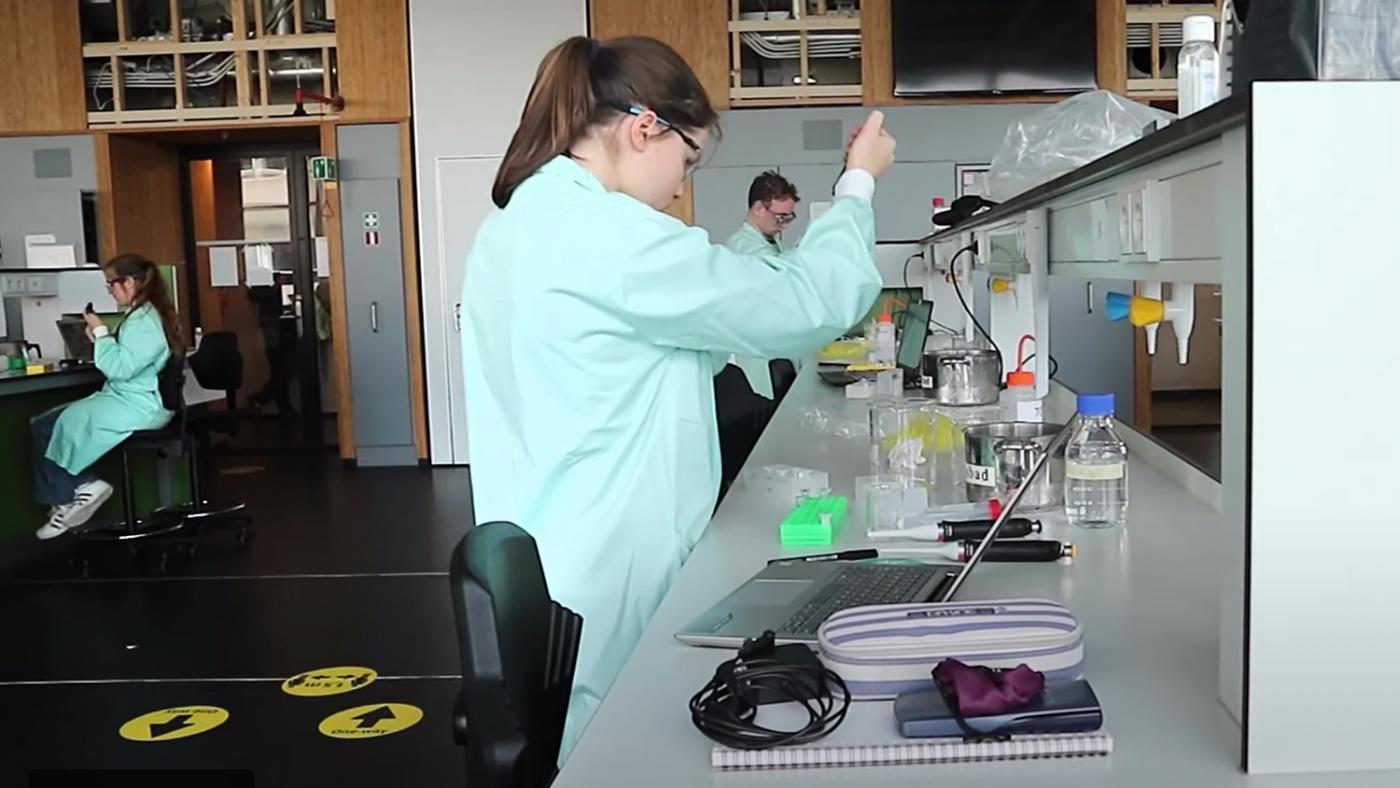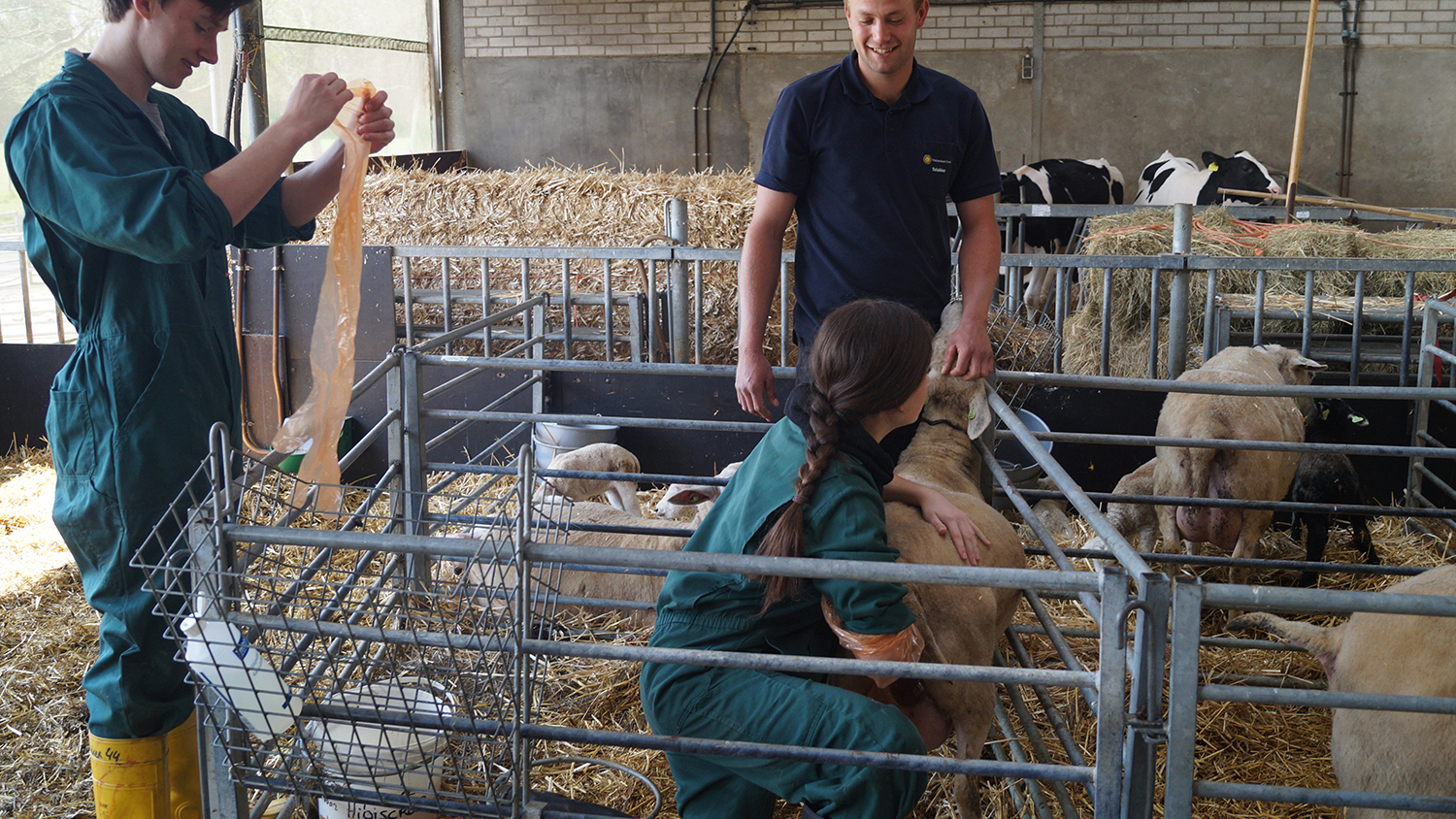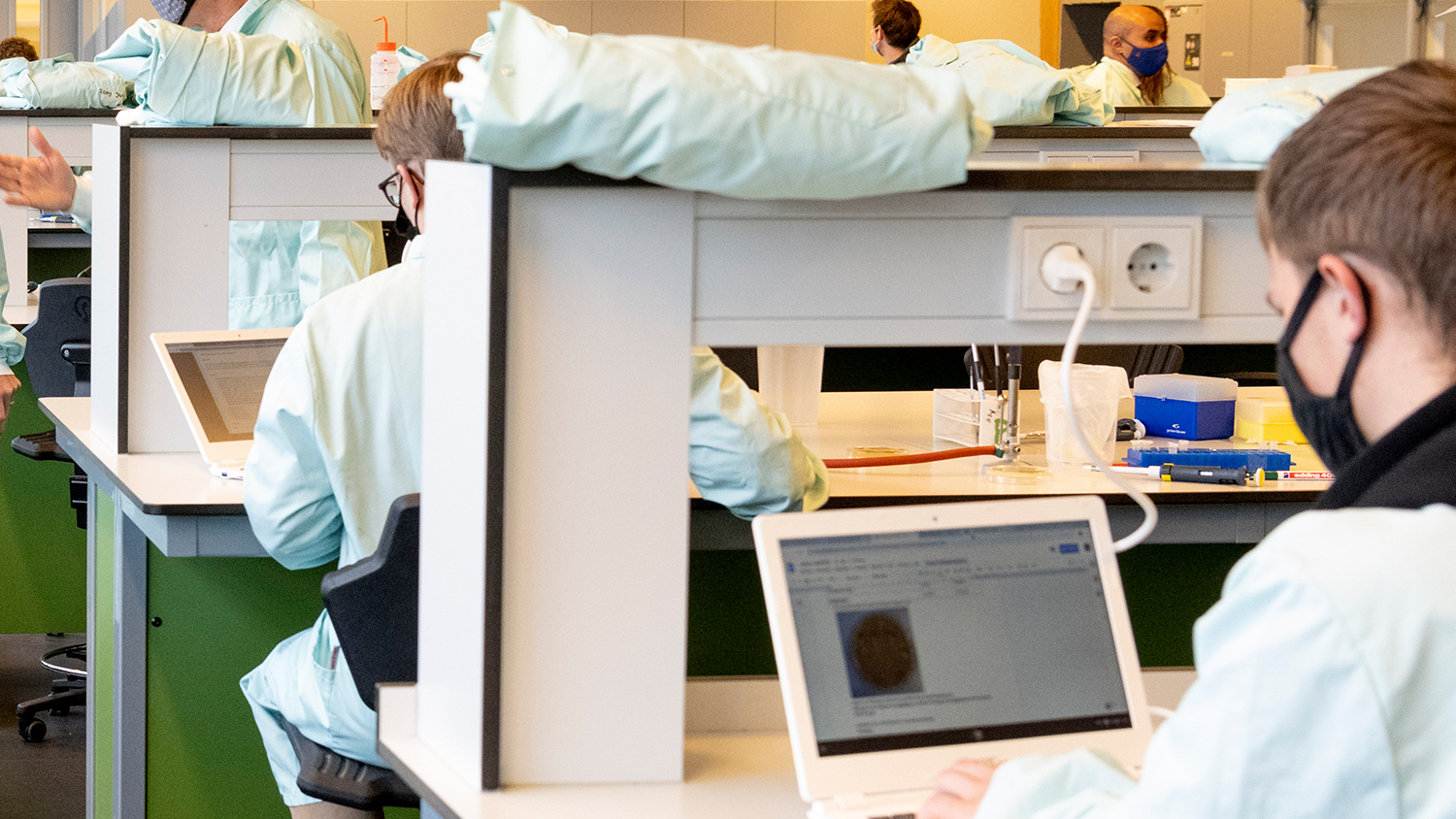Students and teachers had to work extra hard to catch up with cancelled practical sessions

All practical classes were cancelled during the first lockdown in March 2020. That caused some considerable study delays in study programmes at the faculties of Science, Geosciences, Medicine, and Veterinary Medicine, as laboratories suddenly had to close and the residencies for students of Medicine and Veterinary Medicine were suspended.
In the current lockdown, the students are allowed to work in practicum rooms, albeit under strict conditions. The animal clinics also remain open, which means students of Veterinary Medicine can continue their residencies. The same goes for Medicine students. The aforementioned study programmes are also building on the alternatives they came up with last year, which means no new deficits are currently being created in practical education.
Most students have caught up with last year’s delays now that the third block of classes has started, according to the study programmes DUB spoke with. Only Chemistry students still have some courses this block that had been cancelled in last year’s third block. Those doing residencies are also still dealing with delays and, of course, on an individual level, there are surely some students who haven’t caught up with the delays yet because of illness, quarantine, or other personal reasons, corona-related or not.
The first lockdown
Working with Google Earth instead of spending three weeks in Southern Europe
In general, the study programmes adopted a pragmatic approach when the first lockdown shut down practical education in March. “Although the Biology programme in Utrecht is greatly enriched with practical education, those classes aren’t legally required”, explains the Programme Manager for the Bachelor's in Biology, Martijn van Zanten. “During the first lockdown, a number of practical classes that were cancelled didn’t have to be rescheduled. Other practical sessions were taught virtually. Students who would normally study animal behaviour, for example, now did the same through videos”.
At Earth Sciences, fieldwork is a large and extremely important part of the programme, says Education Director Paul Mason. First and second-year students usually travel to Southern Europe in the forth block, but that trip had to be cancelled last year. It was replaced by geological research, made with the assistance of software like Google Earth. They were also shown videos of what they would have encountered themselves had the trip actually happened. “Nowhere near as fun as three weeks abroad, but the content was just as good. The difference is that they didn’t collect the data themselves, but we gave them the data, and then they analysed it”. The programme’s requirements dictate that students must have done fieldwork, but it doesn’t specify how often. "We went to South Limburg at the beginning of the year, so we have met that requirement already”.
No residencies, and studying digitalised specimens on the computer
Many practical courses are legally required for the Veterinary Medicine, Pharmacy, Medicine, and Biomedical Sciences programmes, but since the labs were closed, they had to find online alternatives. Just like the Biology programme, they invested in software that rules out the need to work with microscopes on campus.
The programmes are more than satisfied with the options provided by these digital tools. Cornélie Westermann, Education Director for the Master’s in Veterinary Medicine, explains why: “We had our specimens scanned, so then you can see the specimen on your screen as if you were looking through a microscope. Students can enlarge or zoom out the image like they would when using different lenses. Thanks to that software, teachers can see what the students see more easily than they would in a normal class with microscopes. For instance, if the student has to find a certain cell, you can immediately see whether they’ve indicated the right one”.
According to Westermann, the first lockdown had bigger consequences for Master's students. Residencies were put on hold because the clinics for pets and horses, as well as the clinic for livestock at the University Livestock Practice (ULP), had to shut their doors entirely. “The clinics were only allowed to open their doors for emergencies. The strict regulations meant that we weren’t able to find residency spots for many students. Additionally, because of the lockdown, they didn’t have a lot of options outside the university either. We did our best to come up with alternative, complementary education for Master’s students, such as focusing more on communication with the pet owners. Students were also asked to moderate a forum for pets and write informational brochures”.

The little lambs cannot wait. Photo: DUB
When the rules got relaxed
Working extra hard to start with a clean slate in September
In June, students were allowed to come to the campus again for practical classes, albeit under strict conditions. At that point, there was a lot of catching up to do for the courses that couldn't find a digital alternative. Medicine students, for example, had a deficit in the so-called practical line education, where they learn to diagnose, have conversations with patients, and carry out procedures such as giving people shots.
“We had an incredibly full schedule in June and July”, recollects Martine Koppenhol, Department Head of the Faculty of Medicine. "The organisation, teachers, and students worked themselves to the bone to ensure residencies and internships could start again and the vast majority of students would pass their tests in order to start with a clean slate in September”. Students of Biomedical Sciences didn’t have any significant delays or deficits either.
In blocks 1 and 2, students had to work hard to catch up
At the Pharmacy programme, most Bachelor’s and Master’s students are back on schedule, says Programme Director Robbert Jan Kok. That was made possible thanks to alternative options such as written assignments, for which the practical class aides conducted measurements and collected data for the students. Two groups of students still had to work with "old material" and a few freshmen Master’s students had to catch up on courses during a separate "evening practical class" in the first block.
The Bachelor’s students at Veterinary Medicine weren’t quite on schedule yet at the start of the new academic year. “These are courses that are essential for the learning outcomes we’ve set”, says the Education Director of the Bachelor’s programme, Theo van Haeften. “They had quite a lot to catch up on in the first block, and a little bit in the second.”
Back in the lab, but in a different way
When the laboratories reopened in June, it wasn’t quite business as usual. “We had to change the way we work in the lab”, explains Martijn van Zanten of the Biology programme. "We had to reduce the number of students allowed to work in a lab, which meant that practical classes had to be shorter as well, to make sure that as many students as possible would get the chance to work in the lab”.
“Usually, students spend about four consecutive hours in the lab, and they work together in pairs. Now, we’ve adjusted the experiments. We make sure all the equipment is already on the table where the student will work, which doesn’t only save time, but also prevents a lot of walking around”. The students can still work in pairs, but differently. “When one half of a pair is in the lab, the other half watches the experiment from home, via webcam, so they can share their own thoughts and take notes. The next day, the roles are reversed: number 2 has to continue the experiment that number 1 started the previous day”.
The Pharmacy programme also adjusted its lab programme in accordance with the strict corona regulations. One element of the course Medication Design is preparing medication in a sterile environment. “That's simply impossible now, because students have to be very close to each other in that room. The alternative is that we sterilise the entire practical classroom, so students can perform the actions needed to make this type of medication in a larger group”, explains Robbert Jan Kok.

Photo: Brunopress/Patrick van Emst
Back in the field, but different
Field trips to study nature or geology are, of course, not possible yet. The Biology students who chose the ecology specialisation couldn’t go on their two-week trip to Terschelling, an island in the Northern Netherlands. Instead, they did a practical class on two wheels in Utrecht. "They cycled from the campus to nature areas in small groups. They achieved all the learning outcomes that way”, van Zanten guarantees. First-year Earth Sciences students were able to go to South Limburg again in the first period, says Mason. The only difference is that “in the evenings, they went home instead of sleeping there”.
At Veterinary Medicine, the exam for the so-called skills education was adjusted, according to the education directors. Veterinary students must learn a number of medical practices, and the course usually culminates in a so-called "station exam". All the 225 second-year students and the 225 third-year students have to walk past a "station" to perform clinical research. One caretaker will, for instance, hold a dog on a treatment table, while the student measures its heart rate. “People had to be too close to each other for these exams, which would be irresponsible now. Therefore, in consultation with the exam committee, we decided to provide alternative assignments”.
A silver lining
The programmes are learning a lot from this challenging period. Creative solutions have been introduced, and many of them are here to stay, even after Covid-19 goes away. “That’s the silver lining”, says Paul Mason from Earth Sciences. Robbert Jan Kok, from Pharmacy, also thinks the online conversations with clients will go on after corona. “The students usually practice these conversations between pharmacist and client on campus. Covid has forced them to do parts of this activity online, which is something pharmacists themselves often do, so that’s definitely an element we intend to keep offering, next to the regular communication training where you’re face to face with someone”.
Theo van Haeften, from Veterinary Medicine, reports that the online classes that were created during the first lockdown have been refined since then. “We’ll keep using them after the crisis”. The other programmes agree, because the digital additions have proven their worth and the quality of education was never compromised. All Bachelor’s students who graduate now can continue on to the Master’s level without any issues. Those who will obtain their Master’s degree this year will also have the same competencies as the ones who graduated before corona, they ensure.
Students are hanging on, but they're sick of Covid restrictions
Even so, teachers and staff are eagerly looking forward to the end of the pandemic, when students will be able to go back into the field, have a chat with teachers after lectures, and work on experiments in the lab together. All the interviewed programmes acknowledge that students are having a hard time. “They are hanging on,” says Martine Koppenhol from Medicine, “but they’re not thrilled at all”. Robbert Jan Kok from Pharmacy agrees: “a lot of students and teachers are rather done with online education”. Paul Mason from Earth Sciences: “our students are sad that the fieldwork was cancelled”. Theo van Haeften from Veterinary Medicine adds: “the first-year students come to the campus for work groups, but they still feel lost”. Finally, Cornélie Westermann from Veterinary Medicine stresses that their students “usually spend 40 hours a week at the faculty".
“Students gain less experience than they usually do in our programme,” says Kok from Pharmacy. “Practical classes that usually last four hours have been reduced to two hours, so that multiple groups can be scheduled consecutively. They still have enough time to complete their assignments, but there’s no time to start over if something goes wrong. So there’s a lot less time to repeat things, and making medication is like baking a cake: sometimes you have to do it again and again before you get the recipe right”. But there's an advantage to the Covid regulations: teachers can pay more attention to each student because the groups are small and students work individually.
“Students understand the situation. They were happy that the programme picked up online education so quickly and they are glad that they’re still allowed to come to campus”, says student Sander Heijnens from Biology's Educational Advice Committee. The proof that students appreciate online education came after this year’s first block. “The first course for the freshmen received an 8.5 grade in the evaluations. That’s the highest grade ever.”
"Working their butts off"
That feels like a nice reward for the teachers who had to adapt their classes in such short notice, but that was only possible because “they worked their butts off,” in the words of Cornélie Westermann from Veterinary Medicine. “The organisation was taxed to the limit”, adds colleague Theo van Haeften: after all, it wasn’t just the teachers who had to work harder. The schedule officers and other supporting staff had to put in extra effort as well. “Everyone did their absolute best”, declares Robbert Jan Kok from Pharmacy. “We also worked between 5 and 7pm. Elaborate schedules were created so people wouldn’t have to work double shifts”. Martijn van Zanten, from Biology, agrees: “some course coordinators worked extremely long days and even continued their work at night, replying students' e-mails that they didn’t have time for during the day. The teachers' sense of responsibility was really impressive”. Paul Mason from Earth Sciences is equally impressed with the staff who “with remarkable commitment and a lot of creativity, came up with great alternatives for practical education”.
He keeps a close eye on the corona measures. “The fourth period is coming up and we hope we’ll be able to travel to Italy, Spain or Southern France for our fieldwork. For some of our students, the Netherlands simply doesn’t have the most interesting soil. We’ll decide in mid-March whether or not we’ll travel, but to be honest, the prospects are not the best”. Veterinarians Westermann and van Haeften say they watch every press conference of Prime Minister Mark Rutte white-knuckled. “Will we have to switch again? Will we have to change things? We're managing to keep everything going, but it’s intense to have to switch up our education again, or close everything again”.